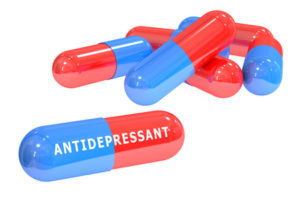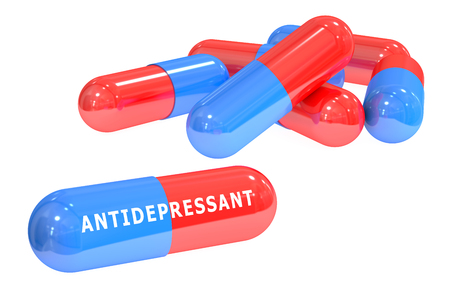
Chances are you know someone who is using an antidepressant. But that doesn’t necessarily mean the person you know has a problem with depression. In 2015, Takayanagi et al. published a study in The Journal of Clinical Psychiatry found that: “Among antidepressant users, 69% never met criteria for major depressive disorder (MDD); and 38% never met criteria for MDD, obsessive-compulsive disorder, panic disorder, social phobia, or generalized anxiety disorder in their lifetime.” Their data indicate that antidepressants were commonly used in the absence of “clear evidence-based indications.”
Writing for Mad in America, Justin Karter noted that previous studies revealed antidepressants were being over-prescribed and prescribed off-label. But others countered that these studies underestimated the lifetime prevalence of so-called mental disorders. The Takayanagi et al. study sought to address this criticism by conducting in-depth interviews to estimate whether participants met criteria for “mental disorders” over their lifetime. The study also indicated an individual was more likely to be prescribed an antidepressant if they were a woman, white, reported physical pain or discomfort to their doctor, or had recently visited a mental health care facility.
Another 2015 report by Kanton et al. published in JAMA found that the percentage of Americans on antidepressants increased from 6.8% to 14% between 1999 and 2012. The report’s authors speculated that the increase could in part reflect shifting attitudes regarding depression. Commenting on this report, Justin Karter pointed out how the increase likely includes a large proportion of off-label use of antidepressants. As was noted above, 69% of antidepressant users did not meet the criteria for major depression.
A JAMA study published in May of 2016 by Wong et al. found that 45% of the prescriptions given for antidepressants were to treat anxiety disorders, pain, insomnia and various other conditions. The study, which was done in Quebec Canada, looked at all adult prescriptions written for antidepressants (100,000 patients) between January 1, 2006 and September 30, 2015. Prescriptions for monoamine oxidase inhibitors were excluded. Prescriptions were classified as on or off label depending upon whether the drug was approved by Health Care of Canada or the FDA for the indication noted by September 0f 2015. Physicians prescribed antidepressant off-label for anxiety disorders (18.5%), insomnia (10.2%), pain (6.1%) and panic disorders (4.1%).
An online survey of long-term antidepressant patients by Cartwright et al., published in Patient Preference and Adherence, found that almost 90% reported some degree of improvement, with 30% also saying they had moderate to severe bouts of depression during treatment. Ten different adverse effects were reported by over 50% of the participants. The five most common were: withdrawal effects (73.5%), sexual dysfunction (71.8%), weight gain (65.3%), feeling emotionally numb (64.5%), and failure to reach orgasm (64.5%). “Between 36% and 57% of respondents experienced these adverse affects at either a moderate or severe level.” Additional adverse effects reported included: agitation (55.1%), feeling not like myself (54.4%), reduced positive feelings (45.6%), caring less about others (36.4%), suicidality (36.0%), and feeling aggressive (31.6%).
Some patients in this study were particularly concerned about severe withdrawal symptoms that undermined their confidence to discontinue should they wish to and therefore limited their choices. In line with this, 45% patients also believed that they had some level of addiction to the antidepressant. Some patients were also critical of the lack of information given by prescribers with regard to adverse effects, including withdrawal symptoms. Some also expressed disappointment or frustration with the perceived lack of support available to them in managing withdrawal.
Limitations of the study include the fact that the data were self-reported and that the study was not a randomized control study—the gold standard methodology for evidence-based medicine. However, there are relatively few long-term outcome studies of antidepressant use.
A 2009 systematic review published in the Journal of Affective Disorders, concluded that long-term outcomes in depression were poor, with no clear relationship between drug treatment and positive outcomes. The outcomes for non-antidepressant treatment were no worse than those for antidepressant treatment.
Overall 40% to 85% of patients experienced a recurrence during follow-up. Average time to recurrence was around 3.2 years across eight studies that provided data on this outcome. Around 25% of patients achieved a global rating of well or improved at the end of the study and a similar number had a poor outcome marked by multiple recurrences or continuous impairment. Most participants recovered from the index episode, but experienced multiple recurrences.
The August 2016 issue of Psychotherapy and Psychosomatics published a literature review of long-term use of newer generation antidepressants (i.e., SSRIs and SNRIs and others) by Carvalho et al. While many side effects were transient, disappearing after a few weeks, other potentially serious adverse events may persist or occur later. The main adverse events related to using newer antidepressant drugs included the following:
- Gastrointestinal issues
- Weight gain and metabolic disturbances
- Genitourinary issues (issues related to the genital or urinary organs)
- Sexual dysfunction
- Hyponatremia (low sodium level in the blood)
- Osteoporosis and risk of fractures
- Bleeding
- Central nervous system issues
- Sweating
- Sleep disturbances
- Affective disturbances
- Suicidality
- Discontinuation syndromes
You can read more information on the above adverse effects and others in the Carvalho et al. review. What follows is a brief discussion of their findings for weight gain and diabetes, bleeding, sleep disturbances, affective disturbances, suicidality, and discontinuation syndromes.
Several studies have shown that long-term use of antidepressants (more than 6 months) is associated with weight gain. Paroxetine (Paxil) may be the worst offender. A population-based study indicated the use of antidepressants could be associated with a higher risk of obesity. The association between antidepressants and diabetes mellitus is inconclusive. Some reports indicate a higher risk; others do not. But a recent review and meta-analysis found that SSRIs were associated with an increased risk of diabetes mellitus.
All SSRIs have been associated with an increased risk of bleeding. “The most likely mechanism responsible for these adverse reactions is a reduction of serotonin reuptake by platelets.” Fluoxetine (Prozac), paroxetine (Paxil), and sertraline (Zoloft) have a higher risk of platelet dysfunction than other SSRIs. Veniafaxine (Effexor) and mirtazapine (Remeron) have been associated with an increased risk of bleeding. SSRIs have been associated with a higher risk of bleeding during operations.
Sleep disturbances are one of the hallmark symptoms of depression. However, studies have shown that SSRIs and Effexor are associated with increased REM sleep latency and an overall reduction in the time spent in REM sleep. These effects are usually associated with the initial period of treatment and may return to baseline after 8 weeks. Remeron and trazodone have been associated with improving sleep. In my clinical experience, trazadone is regularly used off-label to help promote sleep.
Many individuals taking SSRIs report they experience emotional blunting. They say their emotions have been “toned down.” Others say they just don’t care about issues that were significant to them before. “Evidence indicates that these adverse affective manifestations may persist even after the symptoms of depression have improved and can occur in patients of all ages.” Mania or agitation can occur. These response have been said to unveil unrecognized bipolar disorder. But since this can also occur in previously unipolar patients, the mania could be drug-induced. An activation syndrome, where patients experience anxiety, agitation, panic attacks, insomnia, irritability, hostility, aggressiveness and impulsivity can occur.
Carvalho et al. limited the occurrence of these adverse effects to the first three months of treatment. However, psychiatrist Peter Breggin has documented the emergence of agitation and activation with antidepressants in Medication Madness and other writings. Carvalho et al. said using antidepressants could also be associated with the return of depressive symptoms during baseline treatment, and the appearance of new symptoms or paradoxically, exacerbate the baseline clinical picture. The occurrence of paradoxical effects was reported in random control trials with Prozac and Zoloft.
The emergence of suicidality and self-injurious behavior with antidepressant treatment is one of the most debated and controversial risks. Nevertheless, the FDA has required a black box warning regarding the risk of suicidality for children and adolescents using antidepressants since 2014. The incidence of successful and attempted suicide has been frequently underreported in antidepressant RCTs. Carvalho et al. said:
Two recent meta-analyses have not identified a clear increased risk of treatment-emergent suicidality in adult individuals treated with antidepressants in RCTs. Notwithstanding that the use of antidepressants is efficacious for the treatment of MDD in adults, there is no clear evidence for either specific protective effects or increased risk related to suicidality.
Often underappreciated, is the emergence of withdrawal symptoms of varying degrees with treatment discontinuation and/or interruption with almost all SSRIs and SNRIs. These reactions have been described as “discontinuation syndromes” in an attempt to avoid the suggestion of dependence that could effect marketing. A review suggested the dependence and withdrawal with newer antidepressants was comparable to those experienced with benzodiazepines. “Due to the severity and unpredictability of these manifestations, it has been recently suggested that the term ‘discontinuation syndrome’ should be replaced by ‘withdrawal syndrome.’” These symptoms can include:
flu-like symptoms, tremors, tachycardia, shock-like sensations, paresthesia, myalgia, tinnitus, neuralgia, ataxia, vertigo, sexual dysfunction, sleep disturbances, vivid dreams, nausea vomiting, diarrhea, worsening anxiety and mood instability.
In their conclusion, Carvalho et al. said the common belief of fewer side effects with the newer generation antidepressants (especially the SSRIs) only pertains to their safety in overdose. “On the contrary, the long-term use of SSRIs and SNRIs is likely to yield important side effects.” The likelihood of treatment-emergent adverse effects is related to the duration of antidepressant treatment—particularly with weight gain, diabetes, and osteoporsis. Some adverse side effects may persist long after discontinuation of the drug. Particularly following long-term use, antidepressants,
… may increase the risk of experiencing additional psychopathological (e.g. treatment emergent affective switches and paradoxical symptoms), or medical (e.g. obesity and bleeding) problems that do not necessarily subside after discontinuation of the drug.
This leads to their conclusion that: “The findings of this review suggest that long-term treatment with new generation ADs should be avoided if alternative treatments are available.”





